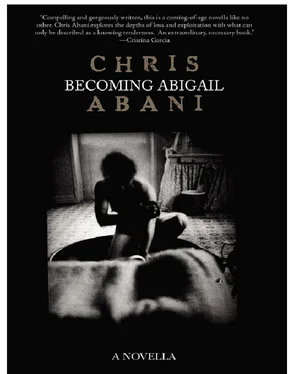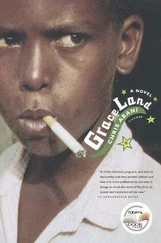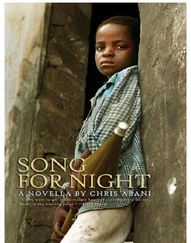So she was always Abigail. Yet not. How could she be? How could she live up to the reputation of a woman who was known to confront wife beaters and explain to them, quietly and politely, that if they didn’t change she would cut off their penises? A woman who was feared by most men for her independent spirit; who at thirty-five became a judge, and set up the first free women’s advocacy group. The shape of that Abigail was so clearly marked, the limits traced out in the stories that filled the world around this Abigail, that it was hard to do anything but try to fill the hollowed-out shape.
Insatiable for her mother, she would seek out anyone who had known Abigail and offer to trade a chore for an anecdote, trying to create memory, make it concrete, physical. She collected vignettes about Abigail, hoarding them fiercely. Then late at night, when all was silent apart from the occasional call of night birds and dogs baying at the moon, she would unwrap them in her mind and feast, gorging herself. Sated, she traced their outlines on her skin with soft fingers, burning them in with the heat of her loss, tattooing them with a need as desperate as it was confused. She tried to talk to her father about this need to see herself, but he couldn’t understand what she meant. Or maybe he just pretended not to. The desire to be noticed for herself didn’t go away though. She couldn’t be the ghost he wanted her to be.
One night, she dyed her hair a bright purple and slapped a thick coat of makeup on, before approaching him as he sat in the kitchen at the old table. The wood was worn and nearly white from all the scrub-downs with warm water and abrasive natural soap. There were knife marks, as fine as paper cuts, in the top. She ran her fingers along them meditatively as she sat down at the other end of the table, opposite him. Some of the cuts she recognized, others she didn’t. Perhaps Abigail had put them there as she cooked dinner for him. Abigail, this Abigail, hated cooking and was surprised to hear that her independent and fierce mother had still found it in her to tend to her husband in this way. Looking up, her father smiled.
“Hey, baby, can I get you anything?” he asked.
“No, Dad, I just wanted to talk.”
“What about?” he asked, folding the newspaper he had been reading into a neat square, which he placed on the table, under the beer mug he had been drinking from. He hadn’t been back from work that long and hadn’t made it to the bedroom to change.
“About my period,” Abigail began. “About being a woman.”
He looked away uncomfortably. “Abigail! How can you bring that up, eh? I was just about to ask you to make dinner.”
“But Dad.”
“Your mother would never have talked like this, you know? She knew the right way to conduct herself,” he said. Then, noticing her hair for the first time, he let out a long sigh. “What have you done to your hair? What have I done to deserve this? And why are you wearing all that makeup?”
“What do you care!”
“Abigail!”
“Which one, Dad?”
“What do you mean?”
“This is me, Dad. Me!”
“I know that. How could I not?” he asked. “You look just like your mother. Now, how about making dinner while I go and change?”
The chair made a scraping sound when he pushed back from the table and stood up. As he left the room, he patted her arm and smiled.
It happened while she was cooking. She looked up and out of the window over the sink. In the soft light of dusk she saw a stranger’s face reflected back at her: a full head of hair, mascaraed eyelashes, and a red gash of a mouth. She was so shocked she dropped the plate she was washing.
“Are you all right?” her father called out.
“Fine,” Abigail mumbled, reaching for the sharp paring knife in the ornately carved wooden rack by the side of the sink. Grabbing a fistful of her hair, she hacked it off. She kept hacking, the hair piling up by her feet, until she had a rough crew cut. Then, reaching into the cupboard above her head, she took out her mother’s set of ten glass dishes with lids and placed them carefully on the table.
Rushing upstairs, she grabbed a tampon, some cherry red lipstick, a pair of frilly panties, nail polish, and a picture of Tom Cruise torn out of a magazine. Returning to the kitchen, she put each of the items into a separate dish and covered it. Then she put some locks of her hair into another, some whole dried chilies into another, rice, a washing glove, and nail clippings that looked like drops of dried blood into the last one. Then she arranged the dishes on the kitchen table in a pyramid. When he came down for dinner a few minutes later, her father took in her wild look and the insane display on the table. He looked all crumpled and creased like an empty cigarette packet.
“Those were your mother’s marriage dishes,” he said finally, as though this desecration was too much.
Of course she realized that there was the flow and the intent, hers and the river’s, and that no amount of thought, or nostalgia, could change this thing at the center of her desire. And how many ways can you describe a landscape? As though the quantities would somehow add up to a math of possibility, a chance even. But such things lay in the realm of luck and were available only to horses and their antagonists.
The neon tower of the Haywood Gallery flashed at her from across the water, part of the ugly South Bank Arts complex. It had never looked so beautiful. The millennium wheel, or the London Eye as it had been officially christened, sat dark and towering like a birthday wish grown too big and abandoned by some child.
She and Derek had taken a ride down the river to Greenwich, from the pier less than five minutes up river, near the cart that sold plastic scale models of The Needle and the sphinxes. They ignored the tour guide’s monologue, just happy to be together in the incredible joy of a spring day. Getting off at Greenwich, they explored the Cutty Sark. The cutter, retired from its days as a trade ship carrying spices and tea between India and London, was now a museum. They had stumbled into each other in the narrow gangways giggling like a pair of school kids. Derek led her through the magic of Greenwich’s famous market, every bit as romantic as an Arabian souk. Carefully, as if more rode on the decision than was visible, Derek chose an antique-looking silver necklace with a large amber pendant. Against the old tarnished silver, the amber looked like a blob of honey melting on dirty ice. She let him put the necklace on her and lead her up through Greenwich Park, past trees that looked older than the ghost stories they had spun, up the hill to the observatory. Below them, on a clear summer’s day, the river and London were visible for miles, he told her, as he pointed away to the distance.
She stood on the line that cut the earth into two time zones, feet inches apart, marveling at how true to life it all was. That one could be only a small step away from another world, another time, and yet caught firmly in one or the other, or as in her case, trapped forever between two. The graffiti, painted and scratched into the wall that curved around the flow of the faded copper line set into the dirt, surprised her, though she couldn’t say why. He kissed her then and looked into her eyes with an infinite sadness.
“I’m sorry,” he whispered.
Cupping his big face between her small hands, a pair of rare, black butterflies sitting on an outcrop of chalk, she said: “No, no.”
He just smiled and rubbed the amber pendant around her neck as though it held the promise of a genie, or as if he were trying to erase something. And they walked through the green of the park. What they walked up was more a rise than a hill, a gentle bumping in the ground. Not unlike what she felt for him: an unassuming tenderness.
Читать дальше












